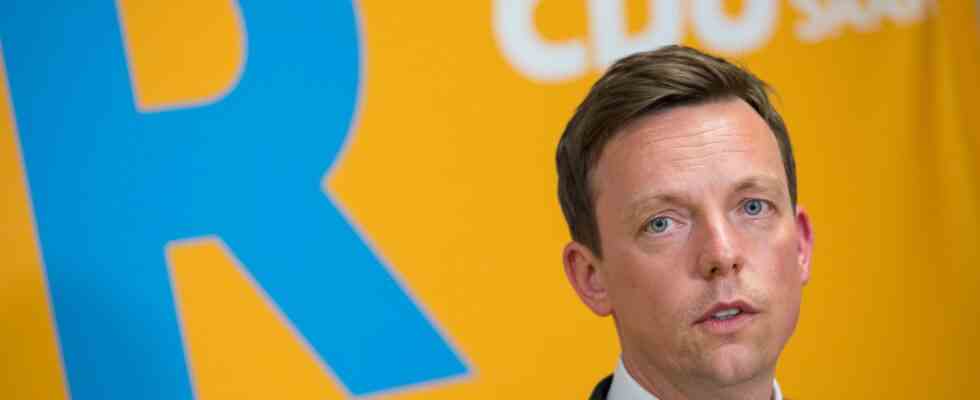analysis
As of: 03/29/2022 7:56 p.m
Politically, Saarland has been a different country since Sunday. After almost 23 years, the CDU has lost power and is no longer even needed as a coalition partner. Things have also slipped in other parties.
It took a whole day for Tobias Hans to publicly announce what everyone expected anyway after Sunday’s disastrous election result: Hans will withdraw from the leadership of the CDU Saar and will not run again as state chairman.
Everything else would not have been negotiable after the CDU lost the state chancellery under his leadership after 23 years. The SPD will govern alone in the future.
Others did not wait as long as Hans did with his public declaration of withdrawal. Even before the state executive board met on Monday evening, it became known who had ambitions to succeed the 44-year-old: Stephan Toscani, still president of the state parliament. For a long time, the 55-year-old was considered crown prince by Annegret Kramp-Karrenbauer until, four years ago, she surprisingly gave preference to Hans when it came to her successor.
Toscani could take over party chairmanship
Toscani has important supporters in the top CDU staff. In the event of an election, he would have the task of rebuilding the Saar-CDU from the rubble. He would then have to fundamentally rethink. As President of the Landtag, he acts in a binding manner, across faction boundaries. Now he could not only become party leader, but also parliamentary group leader and thus leader of the opposition.
There is a desire in the party to put both functions in one hand. Toscani should give the CDU profile, after ten years in the grand coalition, make it clear what distinguishes the Union from the SPD in the first place. In terms of content, the party recently seemed more or less blank.
The task would not be entirely new for Toscani. From 2003 to 2009 he was Secretary General. He would also have to ensure that the party’s leadership circles become more powerful again. There was hardly any communication under Hans, as one often hears from party circles these days. He walled himself in with a small circle of confidants in the State Chancellery. Advice from outside did not get through, decisions were made alone.
Hans should no longer play a role
On May 28, the CDU wants to re-elect its state board. In regional conferences, the defeat should be worked up by then and a new personnel tableau put together. Hans should no longer play a role in this. At the age of 44 he is faced with the shards of his once so promising political career. So far, he has left open whether he will at least take up his seat in the state parliament.
It is questionable whether one last “heartfelt request” to future actors will be granted: namely, to bring more women into leading positions. So far, men have called the shots in the Saar-CDU. And in the personnel speculation, women currently play no role.
The left must reinvent itself
The left also draws consequences from the election. At 2.6 percent, she faces political insignificance. In the last state election, almost 13 percent of Saarlanders voted for the party. At that time, Oskar Lafontaine was still on board and guaranteed double-digit results.
Lafontaine is largely responsible for the fact that the party failed so badly this time. Ten days before the election, he resigned from the left. Country boss Thomas Lutze, with whom Lafontaine has been at odds for years, tried to compare football. Lafontaine’s departure had an effect on the party like an “own goal in the 93rd minute. Then you’re flat. Over. Over. Over.”
Lutze’s time as state chairman is now over. He will not run again at the party conference at the end of May. With this result, it’s “a question of decency,” said Lutze, who still secured a seat in the Bundestag in the last election.
Whoever follows him faces the gigantic task of rebuilding the left in Saarland. In view of the election results and the devastating mudslinging within the party in recent years, it is likely to be a feat of strength to keep them alive at all.
Frustration after defeat by the FDP and the Greens
The Greens and FDP do not hold public personnel discussions, although both parties missed their goal of entering the state parliament. The Greens were just 23 votes short. 4.99502 percent, that’s bitter. After years of internal quarrels, the party is going through a process of renewal. Despite the defeat, the staff seem motivated to continue.
In the FDP, however, frustration could grow. The hopes of finally getting back into parliament after a ten-year break were high, especially after the success in the federal elections.
Country chief Luksic now has to keep the members in line. As Parliamentary State Secretary in the Federal Ministry of Transport, he is often in Berlin. That doesn’t make things any easier.
SPD must fill posts
Meanwhile, the triumphant SPD has problems of a completely different kind. No one had expected a one-man government. The party is now faced with the task of appointing at least six ministers and state secretaries, as well as a state parliament president and the head of the parliamentary group.
The future prime minister, Anke Rehlinger, is optimistic: there are plenty of good staff. However, the party will not be able to use the parliamentary group alone. 19 of the future 29 SPD deputies are newcomers to parliament. The election also caused a stir in the political Saarland in terms of personnel.

